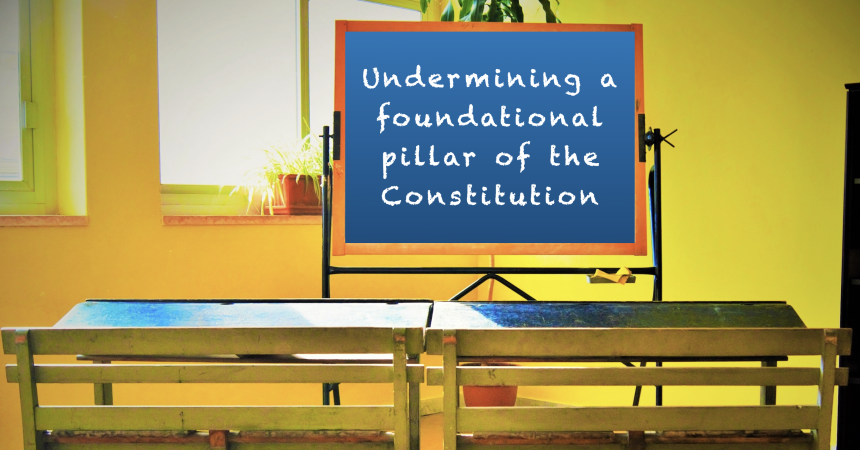
Department of Education is undermining a foundational pillar of the Constitution
Syllabus Religious Education was introduced into second level schools in 2000. It is an exam subject at junior and Leaving Certificate level.
The Department of Education, the NCCA, teachers and schools as well as the TUI all claim that syllabus Religious Education is suitable for all religions and those with no religion, and does not come under Article 44.2.4 of the Constitution. This is the Article in the Constitution that gives students the right to not attend religious instruction if it is against the conscience of their parents. It is a condition of state funding.
But an amendment in 1998 to the Intermediate Education Act 1878 shows that the Department of Education knew in 1998 that syllabus Religious Education does in fact come under the protection of Article 44.2.4 of the Constitution.
The Department’s current position is an attack on the rights of parents under the Constitution. The Department and successive Ministers have undermined a foundational pillar of the Constitution: the rights of parents in relation to the religious and moral education and formation of their children and the right to not attend religious instruction. It is also a misuse of public funds because not attending Religious Instruction is a condition of state funding of schools.
Here’s how the 1998 amendment shows that they are aware of this.
Legislative change needed to introduce syllabus Religious Education
In order to introduce Religious Education as an exam subject Section 5 (4) of the Intermediate Education Act 1878 had to be amended. This was a problem for the Department of Education and the NCCA who wanted to be able to hold and fund exams in religion at Junior and Leaving Certificate levels. Their legal advice was that the Intermediate Education Act 1878 was still in force.
Under Section 5 (4) of the Intermediate Education Act 1878 no exam in religious instruction could take place in publicly funded schools. The Act stated that:-
Section (5) – It shall be the duty of the Board to promote intermediate secular education in Ireland in the manner provided by this Act; (that is to say,)
(4)Generally by applying the funds placed at the disposal of the Board for the purposes of this Act as hereby directed: Provided, that no examination shall be held in any subject of religious instruction, nor any payment made in respect thereof.
The Education Act 1998 amended it as follows:
“35(1) Section 5 of the Intermediate Education (Ireland) Act, 1878, is hereby amended in
subsection (4) by the deletion of “; provided that no examination shall be held in any subject
of religious instruction, nor any payment made in respect thereof”.”
The explanatory memorandum for the Education Act 1998 explained why this was done:
“The Act is the basis for the conduct of the Junior and Leaving Certificate examinations and
the amendment will permit the introduction of religion as an examination subject.”
It follows from this that the funding of Syllabus ‘Religious Education’ as an exam subject comes under the category of ‘Religious Instruction’. Otherwise it would not have been necessary to amend the ban in the Intermediate Education Act 1878 regarding ‘Religious Instruction’ in order to hold and fund examinations in Syllabus ‘Religious Education’.
The Burke case and undermining the rights of parents
Section 62-7(n) of the Education (Admission to Schools) Act 2018 obliges schools to out in their Admission Policies the arrangements for students who exercise their Constitutional right to not attend ‘Religious Instruction’.
Many schools inform parents in their Admissions Policies that they are not obliged to inform them of the arrangements for students not attending ‘Religious Instruction’ because syllabus ‘Religious Education’ is not ‘Religious Instruction’ where the right to not attend applies. Other schools tell parents to come into a meeting in the school to discuss the issue.
Parents have a constitutional right in relation to the religious and moral education and formation of their children under Article 42 of the Constitution.
In the recent Burke case the Supreme Court has said that an overall saver in the Constitution is Article 42.4 (J.Charleton para 4). The obligation on the State to have due regard for the rights of parents reflects a concern for upholding parental authority; a foundational pillar of the Constitution that accords with Article 41 recognising the family as “the natural primary and fundamental unit group of” Irish society. Hence, society is built around the family.
The Department of Education has undermined parental authority in relation to the religous and moral formation of their children. Atheist Ireland will continue to campaign for the rights of parents under the Irish Constitution.






0 Comments
No comments!
There are no comments yet, but you can be first to comment this article.